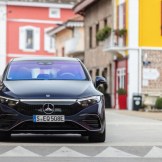The luxurious electric sedan from Mercedes, the EQS, comes to rub shoulders with our test of long journeys traversing the whole of France. We will examine where it ranks among other vehicles that have already established reference times, and whether the cost of these journeys is still under control. Will the German be our new champion?
After showing you the example of the Tesla Model 3 Propulsion, Kia EV6 58 kWh, Tesla Model 3 Grande Autonomie, Hyundai Ioniq 5 and BMW i4, a new electric vehicle will be put to the test of long journeys: the Mercedes-Benz EQS 450+.
We resume the usual rules of the exercise, namely: the start will be at 100% battery, the finish at 20%, and the vehicle will have to drive at the limit speeds. After a reminder of the characteristics of the vehicle (range, battery, charging power) we will focus on our reference journeys to check where it is among all the vehicles already examined.
Thus, with the help of future records of other electric cars, you will be able to decide which one will allow you to travel not only cheaply, but also as quickly as possible. Without further ado, let’s take a look at how the Mercedes-Benz EQS 450+ fares cross-country.
The characteristics of the
It’s not just any electric car we’re looking at today, as the Mercedes-Benz EQS 450+ boasts an exceptional range in the WLTP cycle of 725 kilometers. Its 108 kWh battery will be a significant asset for traveling across Europe thanks to the various fast charging networks, where it accepts up to 200 kW of power.
With a very low air penetration coefficient, controlled consumption and an XXL battery, the Mercedes-Benz EQS 450+ has many advantages for travelling, as we specified in our test.
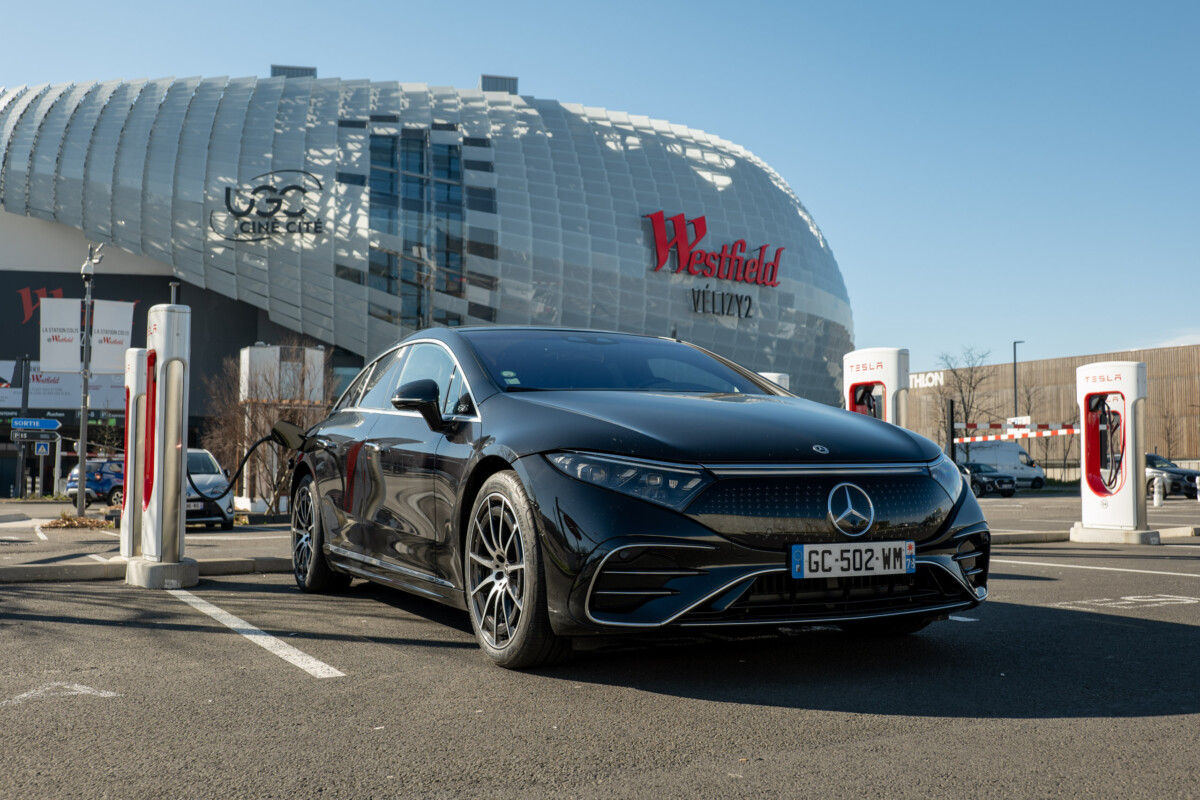
We are indeed in the presence of a reference vehicle for long journeys, as has been confirmed in the field. For the rest, A Better Route Planner is the tool of choice that we use to plan routes, with the default reference consumption for the car model considered today.
Route planning
NOTWe start trips at 100% battery, considering that you have to pay for this filling at the average price per kWh in France, currently at 0.17 euros. This rule, which we apply to all the cars in this exercise, has an advantage for large batteries like that of the Mercedes-Benz EQS 450+: the 108 kWh represent €18.36 when charged at home, compared to 75 euros at fast charging stations. We’ll factor in the cost of that initial home charge when we review each major journey.
The first major route simulates a summer vacation: departure from Orléans and destination Arcachon (530 kilometres). The winter route begins in Caen and ends in Chamonix-Mont-Blanc for a total of 850 kilometres.
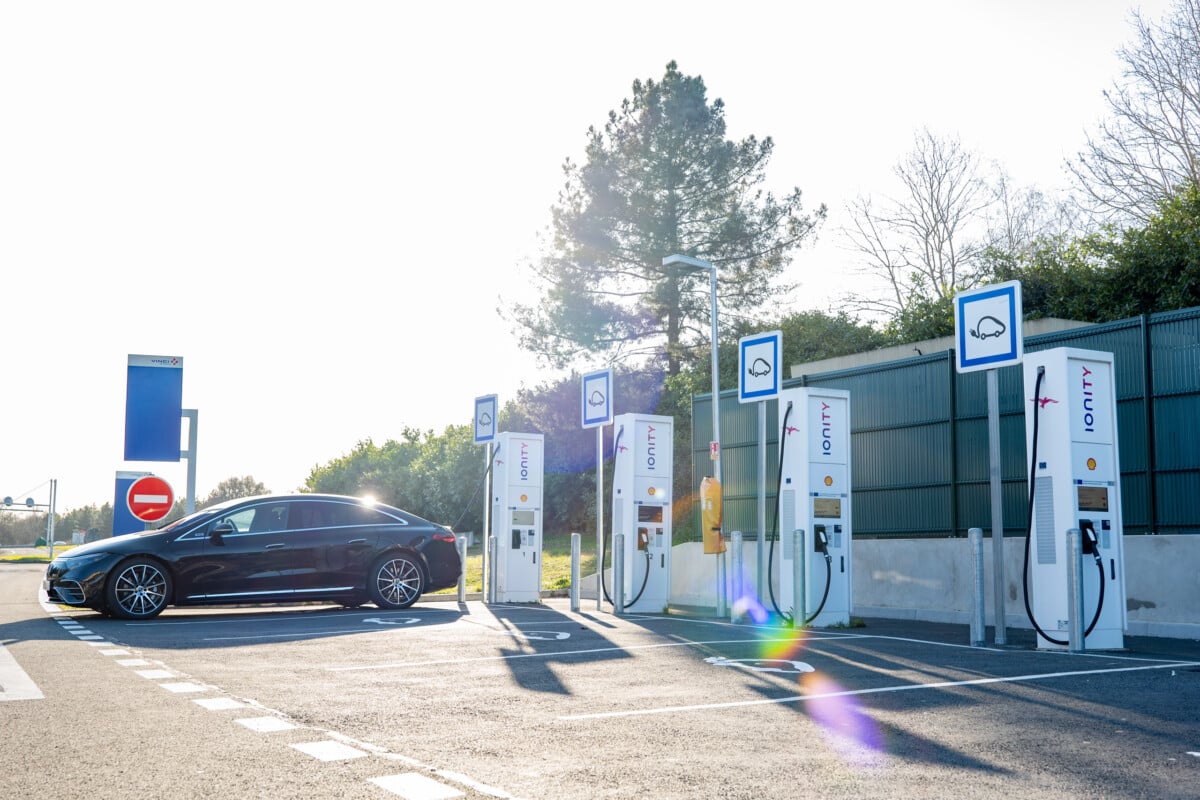
For the summer route, the parameters indicated in A Better Route Planner are as follows: 25 degrees Celsius outside temperature, no wind, arrival at a charging station with 10% battery remaining, and arrival at destination at 20% . For the winter ride, this is much the same, except for the weather, where we indicate a temperature of 0 degrees Celsius.
The balance sheet of the different routes
Too easy for the EQS
The 530 kilometers that separate Orléans from Arcachon in our summer reference route are only a formality for the Mercedes-Benz EQS 450+ which does not even need a quarter of an hour to charge to reach its destination. We note, however, that although the WLTP range promise exceeds 700 kilometres, it is not possible to cover more than 500 kilometers of motorway in one go.
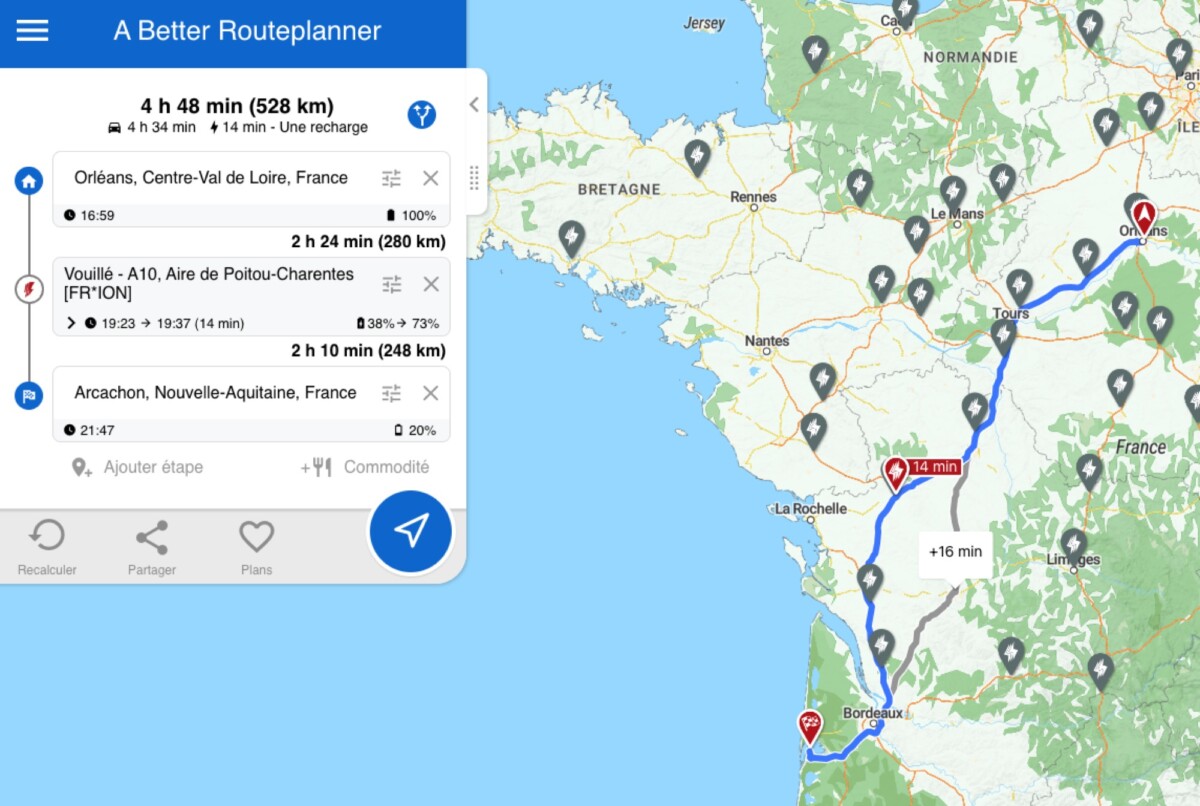
The Ionity network is dense enough today not to have any problems on this route, and 14 minute charge on the Poitou-Charentes service area on the motorway allows you to recover enough battery to arrive safely with 20% battery remaining. At Ionity’s current rate (€0.69/kWh), this charge costs 26 eurosto which it is necessary to add the price of the starting home charge, which gives a total of 44 euros.
The estimated consumption for this great trip is 222 Wh/km, and the estimated autonomy with this consumption is 490 kilometers. Very few electric vehicles allow themselves to be able to travel more than 400 kilometers of motorway, but the Mercedes-Benz EQS 450+ is definitely one of them.
Even in the winter there’s no time to hang around
If some electric cars not only need a lot of charging stops to travel around France, but these stops must also last a very long time, this is absolutely not the case with the Mercedes-Benz EQS 450+. Only two stops are necessary to arrive in Haute-Savoie from Caen, which is moreover in winter conditions.
The EQS’s XXL battery allows it to cover more than 350 kilometers before having to stop for the first time, and this for only 22 minutes. The Ionity station located on the Aire de la Réserve is there to ensure that the battery is sufficiently filled to continue the journey serenely. This charge is invoiced at 44.50 euros.
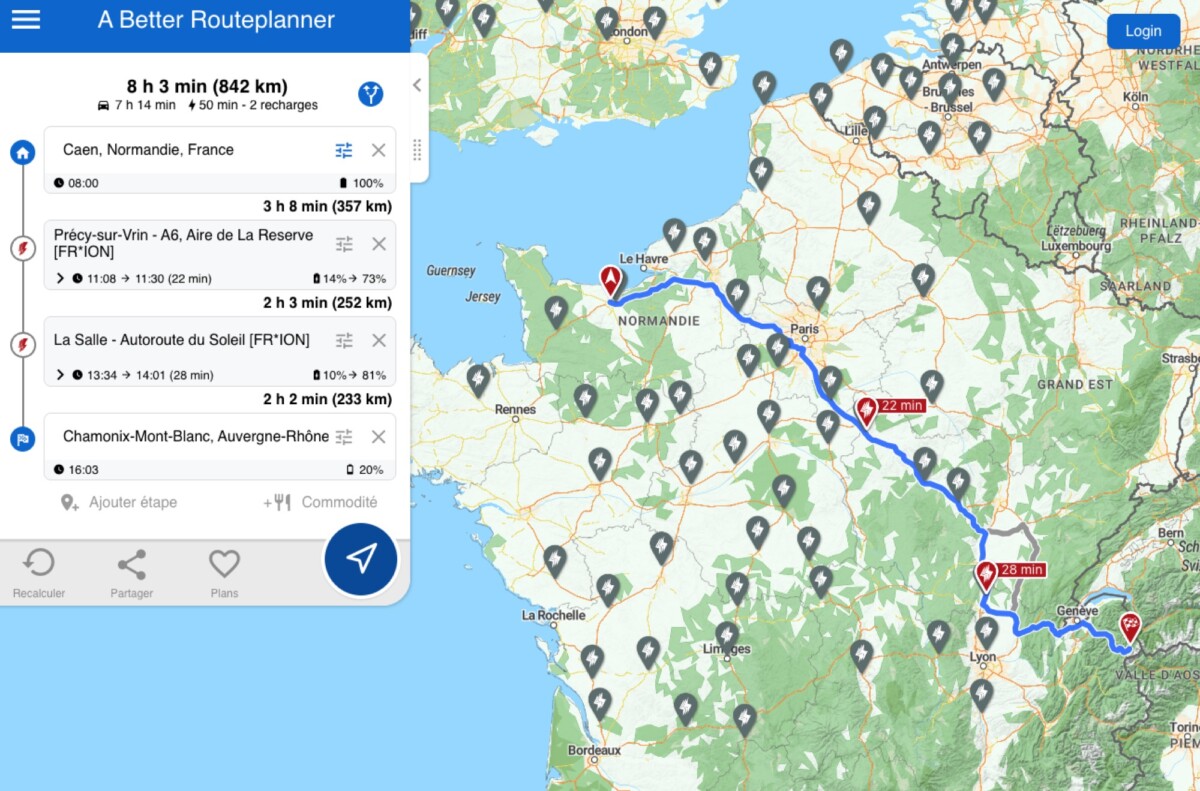
About 250 kilometers further, another charge is needed north of Mâcon, for a period of just half an hour (52 euros). Although this winter journey is cut to undermine electric vehicles, it is clear that the Mercedes-Benz EQS 450+ has no trouble in this exercise.
If you were counting on a recharge stop to restore yourself, you won’t have to hang around! The results of this journey of 850 kilometers by 0 degrees and with positive elevation is excellent for the German sedan, with a 50 minutes total charging time only, and one cost of 115 euros. The estimated consumption is 254 Wh/km, which theoretically allows you to cover 425 kilometers in one go.
Consumption, cost of recharging and autonomy
We summarize the costs and charging times (including home charging at 18.36 euros) in the table below, and you will be able to visualize as we go along with our examples where the vehicle you are interested in is located. compared to others on a similar route.
| Vehicle | Summer ride cost | Summer ride charging time | Total summer journey time |
|---|---|---|---|
| Tesla Model 3 Drive | 36 – 49 € | 31 mins | 5 h 09 min |
| Tesla Model 3 Long Autonomy | 31 – 45 € | 13 – 25 mins | 4 hrs 56 mins |
| Kia EV6 58kWh | 52 – 60 € | 38 – 43 mins | 5 hrs 30 mins |
| BMW i4 | 48 – 58 € | 22 – 37 mins | 5 hrs 11 mins |
| Hyundai Ioniq 5 | 72 € | 36 mins | 5 hrs 16 mins |
| Mercedes-Benz EQS | 44 € | 14 mins | 4 hrs 48 mins |
| Vehicle | Winter trip cost | Winter ride charging time | Total winter journey time |
|---|---|---|---|
| Tesla Model 3 Drive | 102 € | 1 hr 42 mins | 9:16 a.m. |
| Tesla Model 3 Long Autonomy | 101.3 € | 1 hr 02 mins | 8:27 a.m. |
| Kia EV6 58kWh | 120 € | 1hr 54mins | 9 h 59 min |
| BMW i4 | 147 € | 1 hr 32 mins | 9 h 08 min |
| Hyundai Ioniq 5 | 145 € | 1 hr 29 mins | 9:14 a.m. |
| Mercedes-Benz EQS | 115 € | 50 mins | 8 h 03 min |
Conclusion
Whether summer or winter, the Mercedes-Benz EQS 450+ is the ideal electric vehicle to cut the road when you want to get to your destination as quickly as possible. Of course, its price excludes it from vehicles that can be considered for most buyer profiles, but this long-distance exercise is there to try to highlight the differences between each electric car, regardless of price.
With just 50 minutes of charge for the toughest ride in our sim, it’s a new record that the German establishes today. In addition, its large battery recharged at home makes it possible to lower the cost per 100 kilometers at 13.5 euros on the winter route, and 8.3 euros on the summer route.
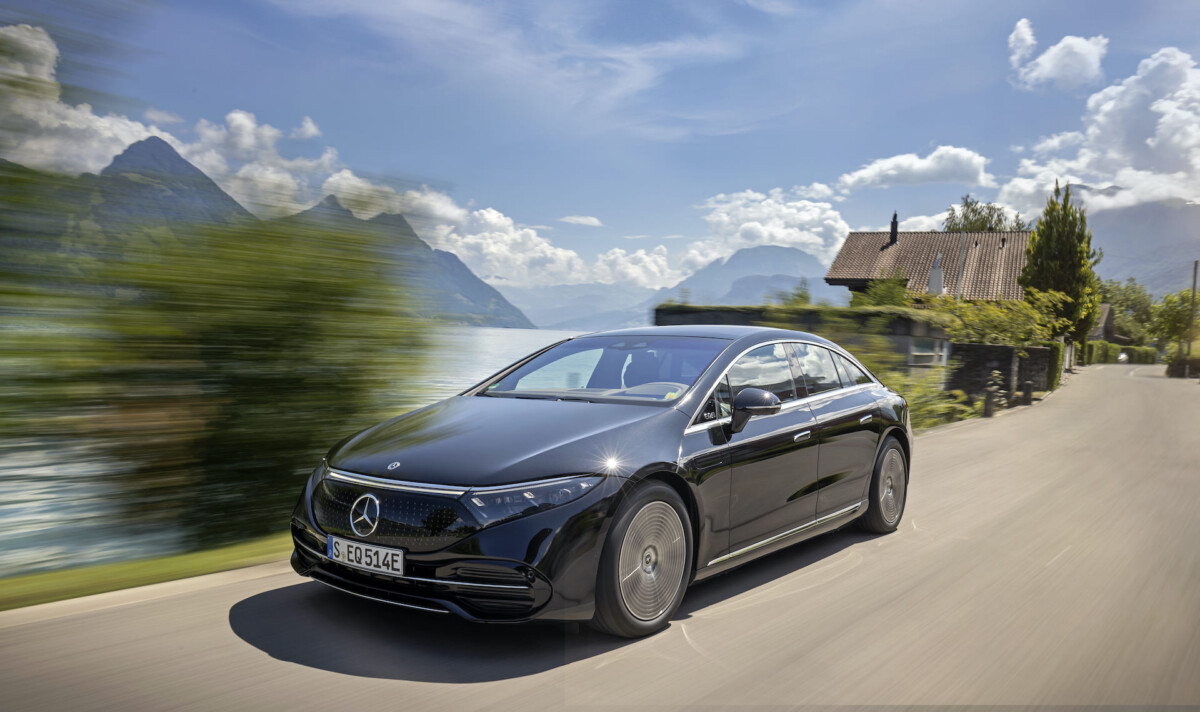
In terms of charging time, no vehicle does better in summer than in winter, but some vehicles still come close. The Tesla Model 3 Grande Autonomie is in a pocket handkerchief with the Mercedes-Benz EQS 450+ on the 530 kilometers of the summer route, for a purchase price almost halved.
The prowess of Mercedes, however, lies in the fact of offering a sedan with luxurious services, while allowing you to travel everywhere at a much lower cost than other less prestigious electric vehicles.. We can cite in particular the Hyundai Ioniq 5 which displays a price of 17 euros per 100 kilometers on the winter route, or 25% more than the EQS.
In a way to reduce costs and consumption, it is possible to optimize charging with the Ionity Passport offer, or to reduce its speed, but you will not arrive at your destination faster in the case of the Mercedes-Benz EQS 450+. The challenge will now be to beat the one that is our new benchmark electric car on this simulation of long journeys. Will the soon-coming Tesla Model S be up to the challenge?
To follow us, we invite you to download our Android and iOS application. You can read our articles, files, and watch our latest YouTube videos.

